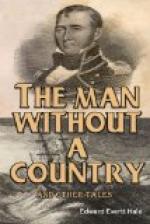ARGUS COTTAGE, April 1, 1842.
THE OLD AND THE NEW, FACE TO FACE.
A THUMB-NAIL SKETCH.
[This essay was published in Sartain’s Magazine, in 1852, as “A Thumb-nail Sketch,” having received one of ten premiums which Mr. Sartain offered to encourage young writers. It had been written a few years earlier, some time before the studies of St. Paul’s life by Conybeare and Howson, now so well known, were made public. The chronology of my essay does not precisely agree with that of these distinguished scholars. But I make no attempt now either to recast the essay or to discuss the delicate and complicated questions which belong to the chronology of Paul’s life or to that of Nero; for there is no question with regard to the leading facts. At the end of twenty years I may again express the wish that some master competent to the greatest themes might take the trial of Paul as the subject of a picture.]
* * * * *
In a Roman audience-chamber, the old civilization and the new civilization brought out, at the very birth of the new, their chosen champions.
In that little scene, as in one of Rembrandt’s thumb-nail studies for a great picture, the lights and shades are as distinct as they will ever be in the largest scene of history. The champions were perfect representatives of the parties. And any man, with the soul of a man, looking on, could have prophesied the issue of the great battle from the issue of that contest.
The old civilization of the Roman Empire, just at that time, had reached a point which, in all those outward forms which strike the eye, would regard our times as mean indeed. It had palaces of marble, where even modern kings would build of brick with a marble front to catch the eye; it counted its armies by thousands, where we count ours by hundreds; it surmounted long colonnades with its exquisite statues, for which modern labor digs deep in ruined cities, because it cannot equal them from its own genius; it had roads, which are almost eternal, and which, for their purposes, show a luxury of wealth and labor that our boasted locomotion cannot rival. These are its works of a larger scale. And if you enter the palaces, you find pictures of matchless worth, rich dresses which modern looms cannot rival, and sumptuous furniture at which modern times can only wonder. The outside of the ancient civilization is unequalled by the outside of ours, and for centuries will be unequalled by it. We have not surpassed it there. And we see how it attained this distinction, such as it was. It came by the constant concentration of power. Power in few hands is the secret of its display and glory. And thus that form of civilization attained its very climax in the moment of the greatest unity of the Roman Empire. When the Empire nestled into rest, after the convulsions in which it was born; when a generation had passed away of those who had been Roman citizens; when a generation arose, which, excepting one man, the emperor, was a nation of Roman subjects,—then the Empire was at its height of power, its centralization was complete, the system of its civilization was at the zenith of its success.




